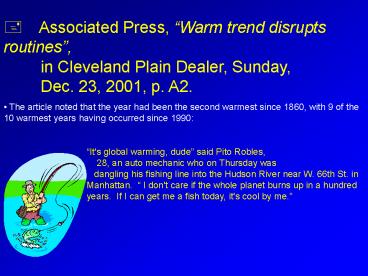Associated Press, Warm trend disrupts routines, - PowerPoint PPT Presentation
1 / 25
Title:
Associated Press, Warm trend disrupts routines,
Description:
... Press, 'Warm trend disrupts routines', in Cleveland Plain Dealer, Sunday, Dec. 23, 2001, p. A2. ... The article noted that the year had been the second ... – PowerPoint PPT presentation
Number of Views:50
Avg rating:3.0/5.0
Title: Associated Press, Warm trend disrupts routines,
1
Associated Press, Warm trend disrupts
routines, in Cleveland Plain Dealer, Sunday,
Dec. 23, 2001, p. A2. The article noted
that the year had been the second warmest since
1860, with 9 of the 10 warmest years having
occurred since 1990
It's global warming, dude said Pito Robles,
28, an auto mechanic who on Thursday was
dangling his fishing line into the Hudson River
near W. 66th St. in Manhattan. I don't care if
the whole planet burns up in a hundred years. If
I can get me a fish today, it's cool by me.
2
(No Transcript)
3
(No Transcript)
4
(No Transcript)
5
(No Transcript)
6
(No Transcript)
7
Courtesy R. Newnham
8
(No Transcript)
9
(No Transcript)
10
(No Transcript)
11
(No Transcript)
12
(No Transcript)
13
(No Transcript)
14
(No Transcript)
15
Climate records show changes have been
Large (one-third to one-half total change from
the ice age to modern)
Rapid (order of one decade, to as little as a
single year)
Widespread (subhemispheric to global)
Repeated
More prominent when the slower forcings were
larger (e.g., during slide into and climb out of
ice age)
Especially affected
low-latitude moisture during warm times
high-latitude moisture during cold times
But really affected almost everything almost
everywhere.
16
New National Academies study just released
Abrupt Climate Change Inevitable Surprises
Committee Richard Alley, Penn State
Raymond Pierrehumbert, UChicago Jochem
Marotzke, Southampton Peter Rhines,
UWashington William Nordhaus, Yale Thomas
Stocker, UBern Jonathan Overpeck, Arizona
Lynne Talley, Scripps Dorothy Peteet, GISS
Lamont J. Michael Wallace, UWashington
Roger Pielke, Jr., CIRES
Staff Alexandra Isern, Study Dir. (now
NSF) John Dandelski, Res. Assoc. Chris
Elfring, Board Director (PRB) Ann Carlisle,
Jodi Bachim, Megan Kelly
USGCRP plus Yale NBER funding. Ocean Studies
Board, Polar Research Board, and Board on
Atmospheric Science and Climate
17
Really brief approximation of the Findings
The Earth's climate system has switches as well
as dials
Flipping a switch causes faster change than
turning a dial
Faster changes are harder to deal with
Switches are harder to predict than dials
We probably don't know all the switches
So, we will be surprised
18
Really brief approximation of the
Recommendations
We should focus research on locating and
understanding switches to help reduce
surprises, through targeted
Paleoclimatic observations
Instrumental observations
Modeling and analyses
And because surprises are still coming, we
should focus research on increasing resiliency
and adaptability of societies and ecosystems
Economic and ecological observations (paleo
and modern)
Modeling and analyses.
19
In particular, research should look for no
regrets policies, that
- Probably make sense even in the absence of
climate change
Are beneficial in a changeable world regardless
of the change.
For example, perhaps we should
Plant trees on the Great Plains to hold soil in
droughts? (It worked before, and drought will
recur.)
Quit having Pennsylvanians pay to water Las
Vegas golf courses? (We might find better uses
for both the water and the money.)
20
Abrupt change needs (NRC Comm.)
- Trigger(s)/threshold crossing(s)
Source(s) of persistence
Globalizer(s) and perhaps amplifier(s)
Pacemaker(s) (not required, but data show for
D/O)
Polar subpolar controlled thermohaline circula
tion easiest source of persistence
Polar-subpolar, esp. North Atlantic,
best triggers (ice-sheet surges, outburst
floods, sea-ice changes, etc.)
Amplifiers everywhere (ice-albedo,
water vapor, clouds, dust, etc.)
Polar-subpolar regions lousy
globalizers need tropical atmosphere.
21
What causes an abrupt climate change?
Huge, rapid forcing (all-out nuclear war,
gigantic meteorite impact) interesting, but
not really the topic of our committee
Forcing across a threshold triggering change
faster than the forcing
Chaotic threshold crossing without any
measurable cause.
Humans thus may be increasing the
likelihood of abrupt climate change
Not because there is anything inherently worse
about human-caused forcing
But because a moving person in a dark room is
more likely than a standing-still person to
stumble down the stairs.
22
(No Transcript)
23
(No Transcript)
24
So, no cause for panic
Humans and ecosystems have experienced a lot
of abrupt climate changes in the past
And humans and ecosystems are still here.
25
But no cause for complacency
The models used to project climate change have
not demonstrated great skill in simulating the
size, speed, and extent of past abrupt changes.
We are likely to be surprised
Surprises are not always pleasant
We complicate the unpleasantness for ecosystems
Abrupt climate change didn't do in the wooly
mammoths, but abrupt climate change plus
fluted-point spears did
In response to large climate changes, rapid (lt
20 years) ecosystem changes and migrations
occurred in past, but there weren't cornfields
and interstates in the way.































